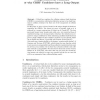499 search results - page 19 / 100 » Why neighbor-joining works |
107
click to vote
MOZ
2004
Springer
15 years 6 months ago
2004
Springer
Common programming practice grants excess authority for the sake of functionality; programming principles require least authority for the sake of security. If we practice our princ...
112
click to vote
ICRE
2000
IEEE
15 years 5 months ago
2000
IEEE
Unless you have a complete and precise description of your product’s requirements, it is very unlikely that you will satisfy those requirements. A requirements document that is ...
138
click to vote
SIGCSE
2000
ACM
15 years 5 months ago
2000
ACM
Classifying is a central activity in object-oriented programming and distinguishes it from procedural programming. Traditional logic, initiated by Aristotle, assigns classificatio...
130
click to vote
GECCO
2006
Springer
15 years 5 months ago
2006
Springer
The effects of neutrality on evolutionary search have been considered in a number of interesting studies, the results of which, however, have been contradictory. Some researchers ...
CRYPTO
2008
Springer
15 years 3 months ago
2008
Springer
A black-box combiner for collision resistant hash functions (CRHF) is a construction which given black-box access to two hash functions is collision resistant if at least one of th...


